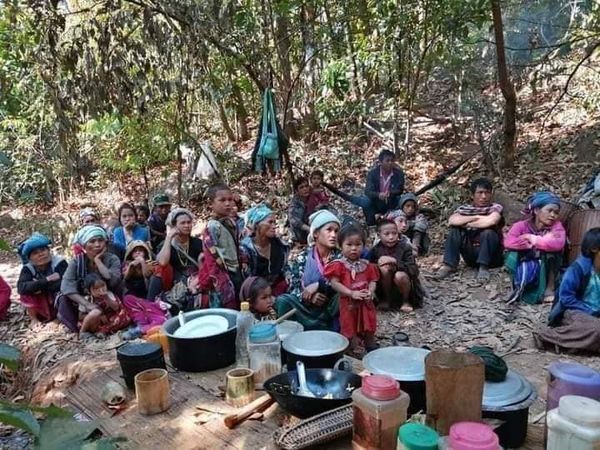The World Turns a Blind Eye to Burmese Military Attacks on Ethnic Villages – more than 50,000 Karen Displaced
More than 50,000 Karen have been displaced since the beginning of the year – local community groups estimate international humanitarian aid is not enough in meeting the survival needs of people forced from their homes and now living in makeshift shelters.

By Conor Phelan*
A health worker, Saw Doe Doh, told Karen News the wet season is adding to the already serious health risks displaced villagers are facing, especially with an increase in malaria, dengue fever and diarrhoea cases. The wet season also adds to the difficulties displaced villagers have to face flooded rivers are dangerous to cross and travelling by road to get supplies or health care is a hard slog on mountain paths turned to thick mud and roads made inaccessible.
Speaking to Karen News, Saw Doe Doh said for communities that are out of their reach, they could only pass on prevention messages.
“We’ve told them to use mosquito nets to protect themselves from mosquito and if they don’t have nets, maybe use small smoke fires to drive away the mosquitos. Similarly, if they don’t have clean water, we’ve told them to boil water before drinking.”
Saw Doe Doh warned the situation will get worse as supplies run low.
“We desperately need more support, we need medical supplies, medicine, warm clothes and all weather materials for shelters.”
Covid 19 and border restrictions as well as military blockades have made it extremely difficult for health workers to get to people needing treatment, many remain sick and scared in the jungle.
In an interview with Karen News, Padoh Taw Nee, Head of the Foreign Affair Department of the Karen National Union, said.
“It’s a concern for us now to have so many people recently displaced. The rainy season makes it difficult to get supplies to them. Shelters have to be built for those who can’t shelter with family or in other villages.”
Padoh Taw Nee is worried the vulnerable in the community are at great risk.
“The vulnerable population like elders, children and pregnant women are at risk from malaria, dengue fever and diarrhea. It’s now the wets season and people will be at risk from respiratory [illnesses]. Security is of great concern to villagers and right now they’re terrified of more airstrikes.”
Padoh Taw Nee said the vicious of the Burma military’s air attacks on unarmed civilians is an international crime.
“The threat of airstrikes is of great concern to the KNU and its people. They lack the resources to defend civilians from airborne attacks, forcing more and more people to leave their homes out of fear.”
Padoh Taw Nee said the onset of wet season storms may have brought some relief to villagers, but requested international governments and United Nations to help.
“We are relieved airstrikes have stopped. We don’t have protection or weapons to stop them. I request international governments and the United Nations to create “No Fly Zones’ in ethnic regions. Or give us the weapons to combat these helicopters and fighter planes – villagers have no protection against this – they are terrified.”
The use of landmines in ethnic areas also has devastating effects for its people, and while both sides use landmines.
“Both sides use landmines, but how they are used is different. The KNLA use them to protect us and to defend our community. We educate villagers on landmines, warn them where they are laid and map them. The Burma Army uses them indiscriminately – in rice fields, on village pathways, in villages – they’re used as a weapon against civilians.” Padoh Saw Taw Nee said.
A civil society worker said there is much more the international community can do to help, yet aren’t.
“Instead of simply putting out statements that condemn the violence of the Burma Army, governments need to be actively involved in delivering humanitarian aid, the Burma military is held accountable for its crimes and helping the people of Burma restore democracy in their country.”
*Conor Phelan is an Karen News intern




